Opinion
The populists triumphed in the state elections in Saxony and Thuringia. Although the result may be without surprises, it is anything but without significance.
Considering that many people were looking forward to these state elections as if the fate of the planet were at stake, they were rather unsurprising. In Thuringia and Saxony, some of the parties in the federal government will be listed under the “Others” category. The AfD is sweeping the board. Sahra Wagenknecht, the eternal opposition, may – or may have to – co-govern with her alliance, which raises fears of moderate chaos in Thuringia in the coming days and weeks.
Democracy has largely stuck to the polls. Unfortunately.
Because being free of surprises does not mean being free of meaning. These elections are a turning point. Almost half of the voters in both countries voted for extreme right-wing and left-wing conservative resentment machines, for forces that are intent on undermining open society. Without them, almost nothing will be possible in the future.
The Sahra Wagenknecht (BSW) alliance has become a force of power with peace slogans that sound as if they were drafted in Moscow. In Thuringia, the strongest force is a group led by a man who sometimes sounds as if he longs for 1933. Authoritarianism is advancing. Anyone who still doubted this now has it in black and white.
The CDU threatens to tear it apart
Of course, there are reasons for the miserable results of some established parties. And anyone who thinks that the republic is on the verge of a return to fascism is giving the right a power that it does not have. There is still a light burning in the middle. But it is getting weaker. In the FDP, it has almost gone out completely.
The pressure on the centre can be seen, for example, in the CDU, for which the election night was somewhat successful on paper, but which is in an existential dilemma. In both Saxony and Thuringia, the AfD can probably only be kept out with overstretched coalitions, with three-party alliances, perhaps even four-party alliances, which would be easy prey for the right and could destroy the Christian Democrats from within.
A CDU leader in Berlin has already failed to form a government in Erfurt, and the next few weeks will be a tough test for Friedrich Merz as to whether he has his shop under control. If the CDU in Thuringia does without Wagenknecht, only the AfD will remain. If it forms an alliance with Wagenknecht and the SPD, the AfD will probably try to denigrate the CDU as a left-wing force from day one. How is that supposed to work out?
The SPD is far from thinking about having more minister presidents at the moment. It has to make sure it survives. Because some Social Democrats were already afraid of being thrown out of both state parliaments, it now seems like a great victory that they were spared that. How absurd.
The SPD could at least defend itself
In Thuringia and Saxony, the comrades are at best only able to secure a majority, while at the federal level they have a chancellor who seems to lack the language and style to stand up to Alice Weidel and Sahra Wagenknecht. It would be a serious mistake for the SPD to simply carry on as before, just because it has not disappeared into complete insignificance in two eastern German states.
No one has to become populist themselves to confront populists, and there is no magic formula against enemies of democracy anyway. But the Chancellor’s party is not forbidden from at least trying to defend itself. Through more clarity and less relativization. Through more emotion and less arrogance. Perhaps it would also help to show a touch of common sense now and then instead of clinging to coalition agreements as if they were holy books. And finally, the SPD could once again make it clear what it is really passionate about politically, instead of making the “fight against the right” a substitute content. Other state elections have already shown that this does not work.
It’s true: a lot can still happen before the next federal election, democracy is more stable than some people make it out to be, and in other European countries populists are suddenly having a hard time again. But this evening shows: authoritarianism has only just begun in Germany.
Source: Stern
I have been working in the news industry for over 6 years, first as a reporter and now as an editor. I have covered politics extensively, and my work has appeared in major newspapers and online news outlets around the world. In addition to my writing, I also contribute regularly to 24 Hours World.




